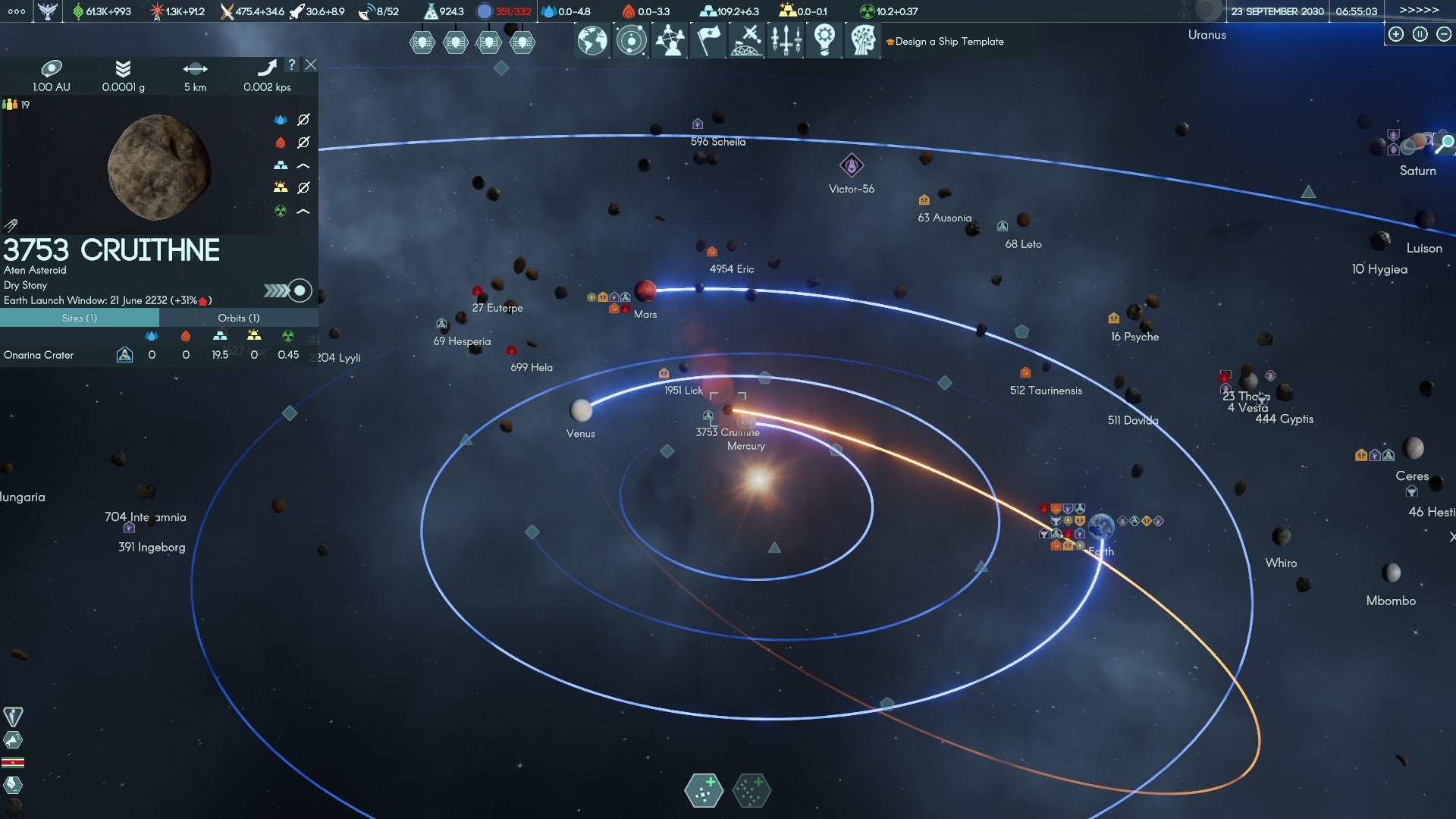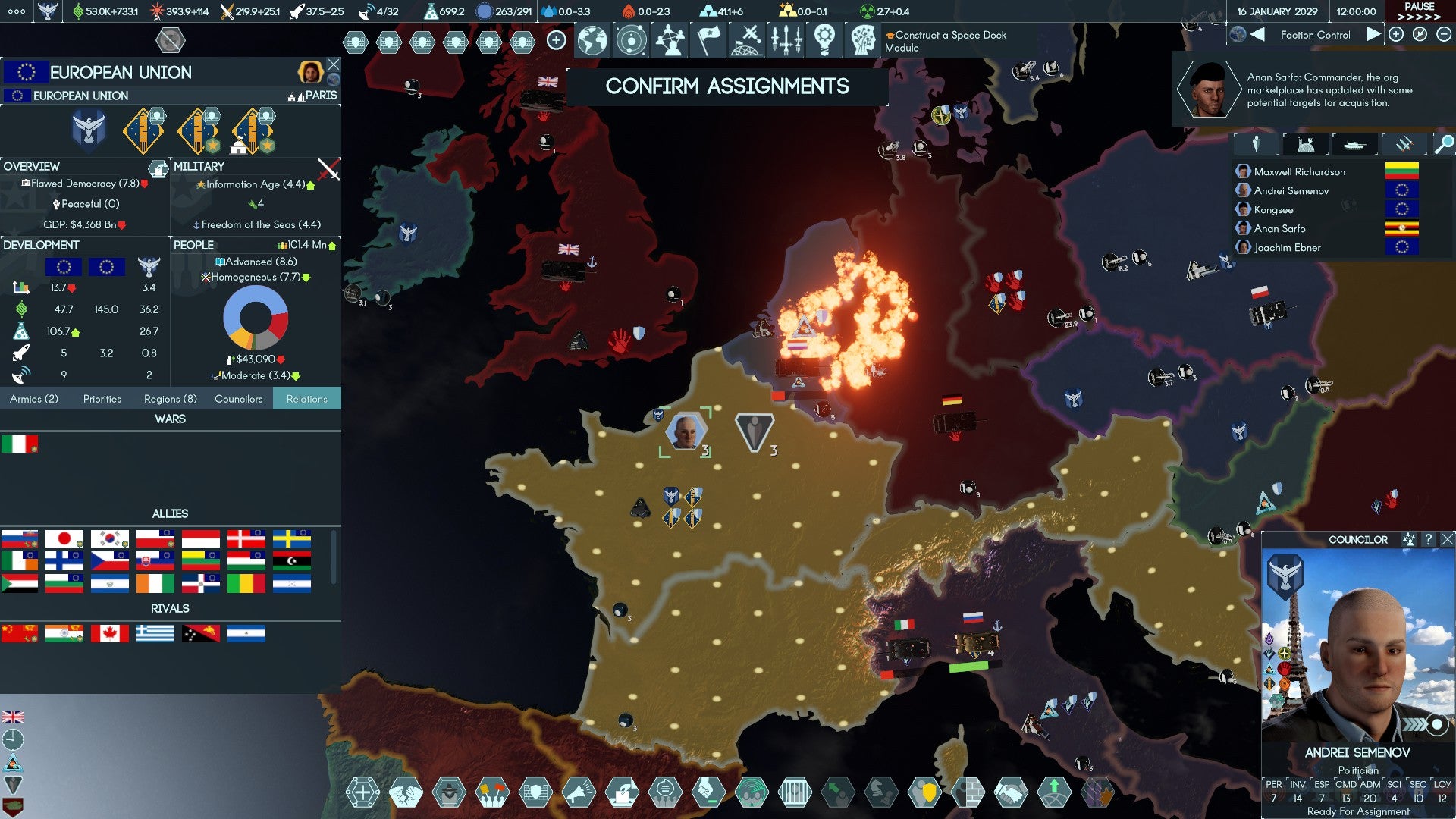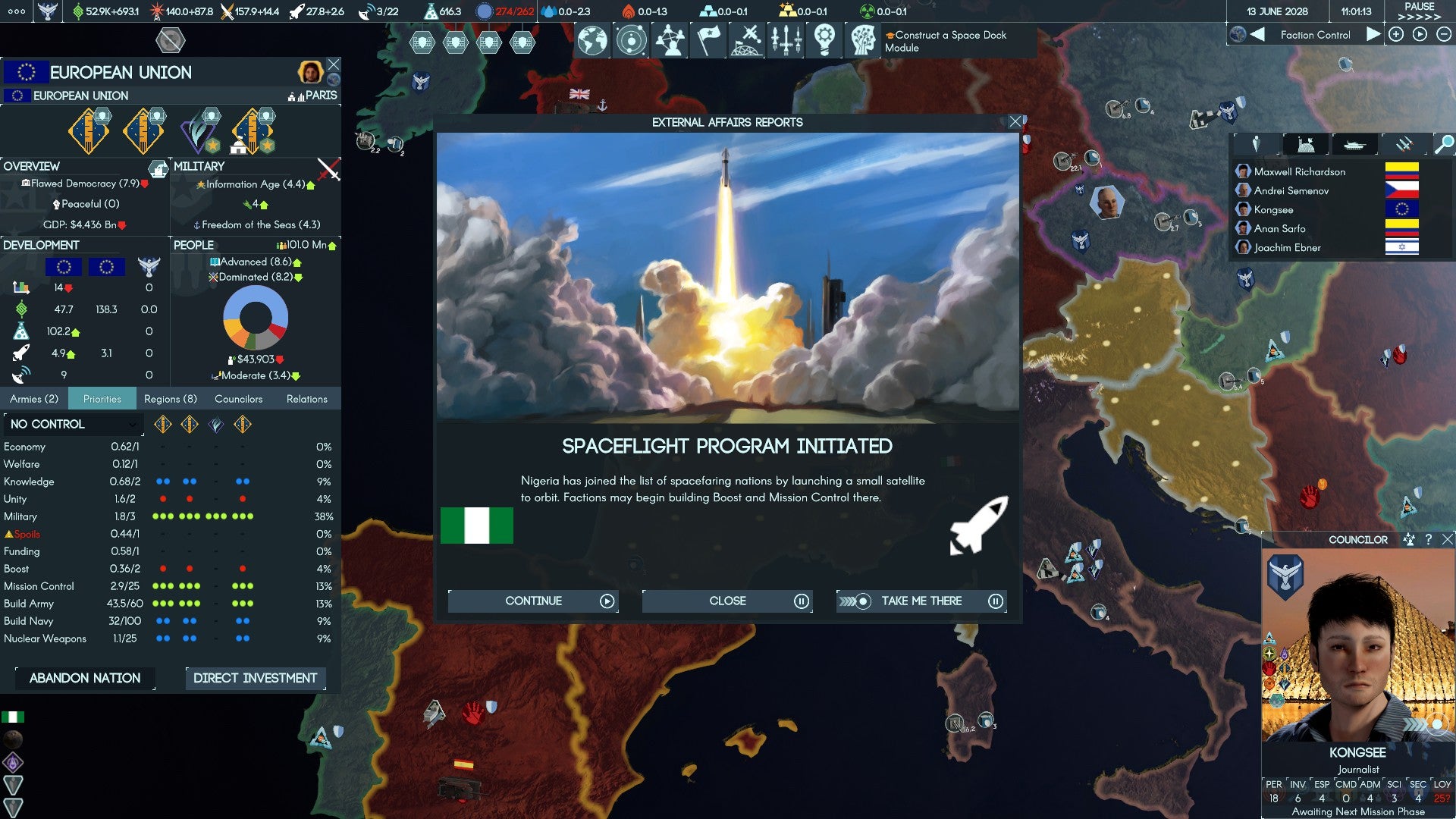This is a hugely ambitious game, covering something I’ve never seen before, with a scope that makes Europa Universalis seem limited. It is a complicated, huge, and ponderous alien invasion simulator that constantly threatens to drop the other boot on you the entire time. Anything you do could be the butterfly whose little wingflaps eventually result in the obliteration of the planet. It is not a game to be powered through, but to be played and contemplated exclusively for a solid month. That is its central weakness. But I think it had to be this way. Its commitment to an idea is demanding, but if you can tolerate some issues with clarity and presentation, the payoff for meeting it is utterly unique. Terra Invicta is the result of the XCOM subgenre stepping into grand strategy. It’s not simply a question of scaling up operations (there’s still Terror From The Deep if you want to gruel through 80 ground missions in a row with no discernible progress), but a thorough reimagining of what fighting an alien invasion would mean. For a start, you never do the fighting. You’re more like Straker, the commander from the ancient TV series that UFO coloured itself in with. Your job is the big picture: to organise, to deal with politics, and to figure out what exactly the alien threat even is. It will be dozens of hours and many in-game years before you even know what an alien looks like, much less what their goals or capabilities are. Secondly, the vast bulk of that fight is domestic. The first decision you’ll make is what faction you represent, and each is wholly defined by its ideological attitude to aliens. Whatever your plans for them, you will necessary have to put together some kind of global operation, while the six other factions contest your claim to represent Earth. Each has a truly different vision for humanity, fundamentally incompatible with the others. Each, too, is actually believable. Your first job, long before any notion of launching interceptors or bulk ordering grenades, is to build the consensus needed to organise at all. The closest thing to XCOM is the Resistance (frustratingly equivocal cowards who can only react to a politician spreading pro-alien propaganda with “he has a right to his opinion”, instead of shooting the quisling shit in the face), and there are the Sirius-esque Servants who worship the aliens, the full-xenocide now guys, and two slightly more nuanced outlooks. Best of all, there are two wild cards: the Initiative, who don’t care as long as they come out on top, and whose share of opinion polls is listed as “various exploitable beliefs”, and Project Exodus, the worst people on the planet. A techbro moronarchy whose plan is to build a colony ship and fly away. They can actually represent a massive threat because they explicitly don’t care about Earth. It’s so utterly asinine that it’s honestly a bit too real. You can already tell how much I’m loving this, right? Terra Invicta lives in your imagination in a way that recalls Crusader Kings far more than its actual structure does. You have the run of the whole planet, divided by country (with a few mergers). Each country hosts control points representing internal social structures like its legislature, religious organisation, mass media, corporations, and so on. Your first step is to infiltrate these, and redirect their resources. Taking the final control point lets you dictate its alliances, wars, and membership of multinational federations. You can reinvest their GDP to build it up, or outright siphon it off instead, driving them into the ground, have them build armies, and even build nuclear weapons, but the most vital is “boost”, because that’s your first step on conquering space. Terra Invicta models the solar system too, you see. Zoom out enough and you’ll see every planet and moon and asteroid, all orbiting in real time. Whatever your motive, your primary means are prospecting, mining, and militarising space. “Boost” gets things into orbit, and builds space labs and moon hydroponics and asteroid shipyards, where you’ll design and build ships too. What, you thought the aliens were going to land in wheat fields ten at a time and shoot at you with handguns? Most of your work is accomplished by “councillors”; unique individuals you send around the world to spread your views, infiltrate governments, investigate alien activity, sabotage space stations, and steal from rivals. They gain experience and traits, improving their skills, and can control dozens of real-world organisations like investment banks, research institutes, and spy organisations. This is a game in which you can buy MI5, engineer a coup in Saudi Arabia, witness Belgium dropping a nuke to defend itself from a China-Poland-Greece invasion, research a project that enables indigenous movements to break up Canada, and still be a dozen hours away from your first direct alien encounter. It is a slow, slow, s l o w game. It’s probably why it’s not strictly real time. Every few weeks time pauses so you can order your agents. Between that, everything happens in real time, almost always at maximum speed, and it’s very repetitive. Progress is inexorable and easily reversed, and your capacity for controlling nations is finite, so you can’t just blob everything. In fact one early strategy is to target poorer nations and squeeze them until you can bag a global power, then abandon them. Personally, I favour broad coalitions of cheaper B-listers to uplift, while everyone else fights over behemoths like the USA and EU, but a lot is dictated by what types of councillor you’ve recruited. I have a spy who’s great at rooting out enemy councillors, and a silver-tongued journalist who turns them into double agents, who can deliberately fail missions, or report back on other councillors, allowing my scientist to steal their research projects, my politician to buy out their organisations, and my spy to systematically assassinate the entire Project Exodus council, including the mole for good measure. This game makes you a monster. But because so much is at stake, it doesn’t feel grubby, even when you find yourself going “well, I mean, they’ve built two armies, so I might as well use them…” and kicking off a war in Indonesia because there is something weird going on in there and the Protectorate have been way too quiet and I don’t like it, goddamn it. You can’t ignore anyone, and it’s important to mess with whatever they’re doing. The unique research system ties into this, too. There’s public research, which everyone can contribute to, and unlocks projects for everyone to research privately. Whoever contributes the most to a public project chooses the next one, so you can drive global research in directions that favour you, or let others do the heavy lifting while you try to gain an edge. But that leaves the niggling concern that this will leave humanity as a whole weaker when the aliens really step up. The downside is that the research tree is absolutely overwhelming. There are innumerable projects, a sluggish, barely navigable tech tree, and so little context given that I quickly gave up contributing to any public research at all. I was already unlocking a dozen private projects for every one I could finish. Naval hardware is particularly opaque. Before my first ship, I had half a dozen engine research projects and nothing to contextualise them. It’s not made that clear that you’re supposed to build a navy at all, much less how to build or support one, nor whether it’s worth bothering with early ones at all, nor what’s already obsolete. The notifications are a mess, too, with rolls of constant irrelevant information. Being in the dark about practical matters means that building the wrong stuff is worse than useless. Mistakes may not show for a long time, and there’s just so much STUFF and so little capacity to pursue 95% of it that it largely becomes background noise. I feel like even my successes are largely down to guessing well. I can’t shake the feeling that no matter how well I appear to be doing, I am already screwed either because of some hidden system I had no idea about, or because my strategy was never viable. But I can think of no other game where I’d get a peace envoy from rival-controlled Venezuela to my people in Colombia, lean back and say to myself “That’s interesting. Why would they do that?” while pondering the strategic implications. Are they afraid I’ll use the army to invade? Are they intentionally messing with me? Should I even care either way, given that I’m about to break multiple global empires into a raging ocean of independence movements that support my cause? Terra Invicta gets you caught up in petty squabbles and tunnel vision, inviting disaster of your own making as the aliens pop up their heads, and you immediately tear the world apart fighting over what to do about them while they pop back down again. This is why it works despite the poor UI and poorly laid out, often absent information (which, it should be noted, are all elements that tend to come in the home stretch of an early access period): while the game should be much, much clearer, the aliens are exactly that. It’s recaptured something of UFO that many successors failed to: the sense of a genuinely unknown enemy. They’re inscrutable, subtle, and apparently arbitrary, but you know they’re coming, somehow, at some point. Go into it assuming that you’ll lose, because this is about the journey. “What kind of world did my decisions leave us with” is a more entertaining question than “did I win?” anyway. Despite spinning off from a very familiar premise, it’s a unique concept with an early-spacefaring setting that most fiction skips past straight to the galactic empire stuff, and its glacial pace and utter opacity might actually be necessary, despite my sometime frustration with it. Progress is inexorable but there is always progress to be made, even if it’s just speculatively messing with enemy assets. Although playing more PR tug-of-war and whack-a-mole with enemy agents will diminish the variety of trying other factions and wildly different strategies, I kind of want to. I could barely cover half of what it does even with another article or two. The more I play, the more I have to say about it, and I’ve played it ten times longer than most games. Terra Invicta is a fascinating, astonishingly ambitious game that nothing else can really compare to. But there is almost no chance I will ever have time for it all.



